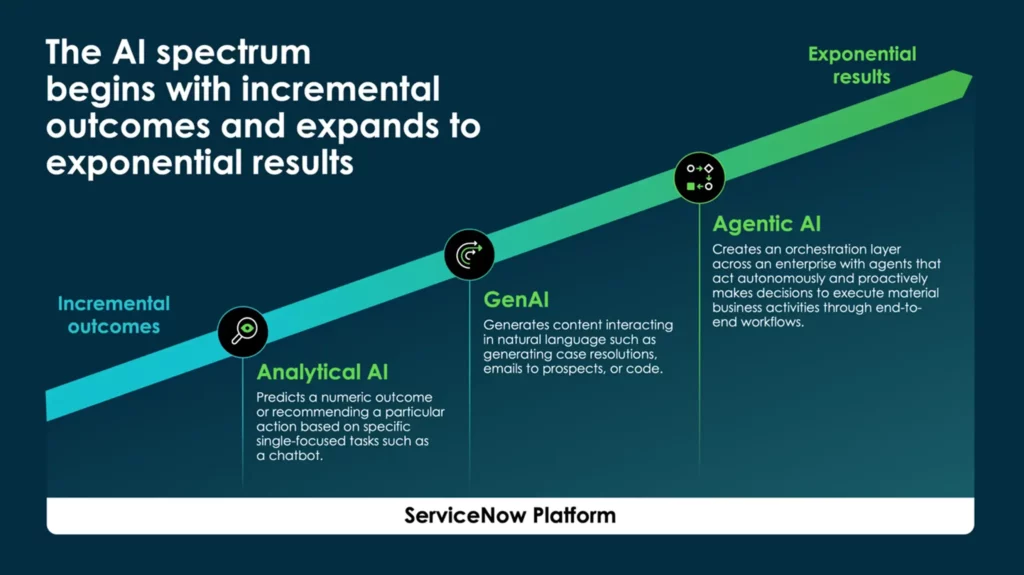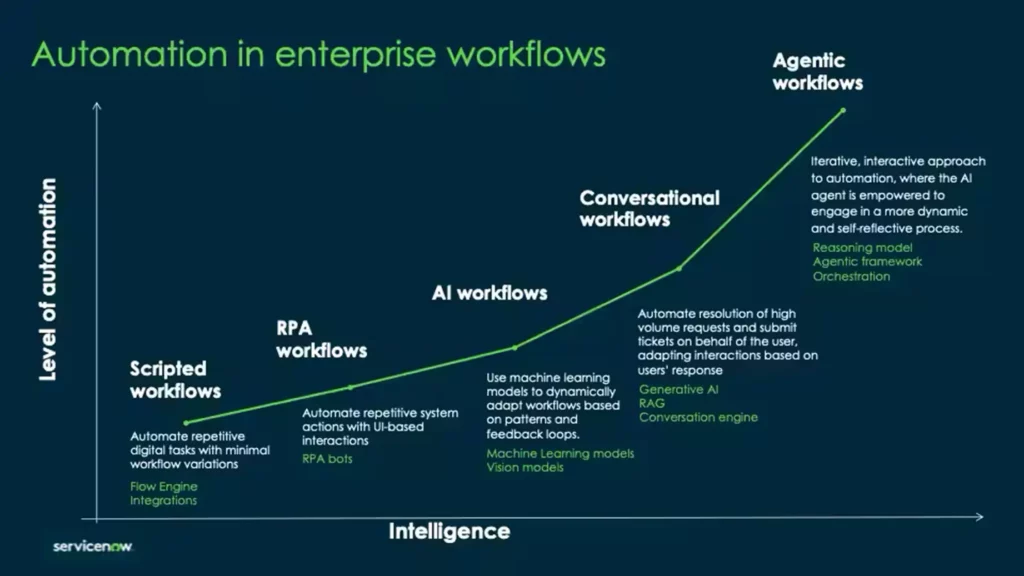Two AI approaches, one goal, efficiency rethought
Digital transformation has long been considered a must for companies, and artificial intelligence is making the decisive difference. But not all AI is the same.
ServiceNow, one of the leading providers of digital workflows, now offers two pioneering AI technologies that are revolutionizing processes, but in very different ways:
- Now Assist: A generative AI that assists humans
- AI Agents: Autonomous software agents that perform tasks independently
Both approaches offer enormous efficiency potential, but for different requirements. In this article, we compare both solutions in detail, show practical examples and help you to identify the right area of application.
The AI evolution at a glance
To better understand how these two technologies are embedded in the ServiceNow ecosystem, it is worth taking a look at the following diagram:

This chart clearly shows that the development of AI in companies runs along a spectrum, from assisting to autonomously acting systems. While Analytical AI makes simple predictions or recommendations, GenAI is already generating content independently. The highest level of automation is achieved by AI agents that can act completely autonomously in complex business processes.
Now Assist, Generative AI as an assistance system
Now Assist uses the power of generative AI (GenAI) and links it intelligently with the ServiceNow workflow system. The idea: employees are not replaced, but rather relieved by intelligent assistants.
Functions and areas of application of Now Assist
Now Assist is used in various business areas, including:
- IT Service Management (ITSM)
- Customer Service (CSM)
- HR and Human Resources (HRSD)
- Field Service Management (FSM)
- App development with Creator Workflows
Examples of Now Assist in practice:
- Case summaries: Automatic generation based on existing data
- Chat summaries: Saves time when escalating tickets
- Knowledge articles: Automatically generated knowledge base articles
- Flow generation: AI supports developers in creating workflows
- Catalog entries: Faster creation through voice commands
AI Agents, Agentic AI for autonomous process control
AI agents go one step further. These are so-called agent-based AI, i.e. systems that perceive, decide and act without the need for human intervention.
These virtual agents are able to carry out complex, multi-stage processes independently, for example in IT operations, security coordination or finance.
A look at the role of autonomous AI in companies
The next visual insight shows how comprehensively and profoundly agentic AI can be anchored in modern company processes:

This graphic illustrates that AI agents are reaching a new level of operational automation, where systems no longer just react, but proactively act, optimize and make decisions that were previously reserved for humans.
Typical application scenarios for AI agents
- IT Operations:
- Software provisioning for new employees
- Diagnosis and resolution of IT faults
- Security & Risk:
- Password reset after security alert
- Coordination of a multi-stage phishing response
- Human Resources:
- Automated vacation approvals
- Onboarding: accounts, devices, training courses
- Customer Service & CRM:
- Return processes
- Product recall – including customer messages and system updates
- App Development:
- Syntax checking, test coordination, deployment
- Finanzen & Supply Chain:
- Release of expenses
- Quarterly financial statements incl. data aggregation and reporting
Now Assist vs. AI Agents: an overview of the comparison
| Feature | Now Assist (GenAI) | AI Agents (Agentic AI) |
| role | Assistant for employees | Autonomous “employee” in the background |
| Main benefit | Increased productivity through text/content generation | Fully automated processing of tasks |
| User interaction | People remain at the center | Decision & execution by the AI |
| Typical tasks | Summarize, create, support | Monitor, decide, execute |
| Use cases | Knowledge articles, chats, incident summaries | IT-Ausfallmanagement, Onboarding, Compliance-Aufgaben |
| Time-to-Value | Quick to use, few configurations required | Greater configuration effort, but greater effect |
Two powerful tools for a smarter company
The combination of generative assistance (Now Assist) and autonomous agents (AI Agents) forms the technological backbone of a new era of automation, efficiency and scalability in companies.
While Now Assist shines where quick decisions, text generation, communication and contextual summaries are required, AI Agents take on the complex, multi-level processes, from IT troubleshooting and security measures to the complete orchestration of financial or HR processes.
The two AI technologies should not be seen as alternatives, but as complementary tools:
- Now Assist increases the productivity of your employees by specifically relieving them of repetitive or communicative tasks.
- AI Agents, on the other hand, transform your operational processes by autonomously mapping entire workflows without manual intervention.
The right combination of both solutions creates an intelligent, scalable service architecture that is not only reactive, but also proactive. As a result, companies not only gain speed, but also quality, satisfaction and future security.
Conclusion:
ServiceNow AI in any form helps companies optimize their customer service. If you want to gain a competitive advantage by providing world-class customer service, consider implementing AI with our experts at Servistio.
